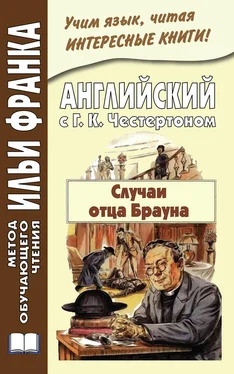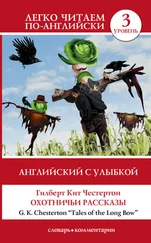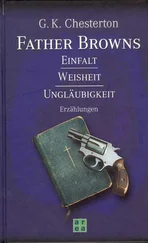
 But one of them stood forward beside the olive-faced young man in the red waistcoat, and carried a large black case of unfamiliar form.
But one of them stood forward beside the olive-faced young man in the red waistcoat, and carried a large black case of unfamiliar form.
“Your name,” said the young man, “is Saradine?”
Saradine assented rather negligently.
The new-comer had dull, dog-like brown eyes, as different as possible from the restless and glittering grey eyes of the prince.
But once again Father Brown was tortured with a sense(и еще раз отца Брауна посетило мучительное чувство; once – один раз; again – вновь, опять; to torture – пытать, мучить ) of having seen somewhere a replica of the face(/будто/ он уже где-то видел точь-в-точь это лицо; replica – реплика, точная копия ) ; and once again he remembered the repetitions of the glass-panelled room(и еще раз он вспомнил повторения /лиц/ в комнате со стеклянными панелями) , and put down the coincidence to that(и приписал им это совпадение; to put down to – объяснять /что-л. чем-л./ ) . “Confound this crystal palace!” he muttered(да чтоб этому хрустальному дворцу пропасть! – пробормотал он; to confound – смущать, сбивать с толку; проклинать /уст./; confound it! – будь оно проклято! ) . “One sees everything too many times(видишь все слишком много раз; one – кто-то, некто; употребляется в неопределенно-личных предложениях как подлежащее ) . It’s like a dream(/прямо/ как во сне) .”
“If you are Prince Saradine,” said the young man(если вы принц Сарадин, – сказал юноша) , “I may tell you that my name is Antonelli(/тогда/ я могу сообщить вам, что мое имя Антонелли; to tell – рассказывать; сообщать, ставить в известность ) .”

 But once again Father Brown was tortured with a sense of having seen somewhere a replica of the face; and once again he remembered the repetitions of the glass-panelled room, and put down the coincidence to that. “Confound this crystal palace!” he muttered. “One sees everything too many times. It’s like a dream.”
But once again Father Brown was tortured with a sense of having seen somewhere a replica of the face; and once again he remembered the repetitions of the glass-panelled room, and put down the coincidence to that. “Confound this crystal palace!” he muttered. “One sees everything too many times. It’s like a dream.”
“If you are Prince Saradine,” said the young man, “I may tell you that my name is Antonelli.”
“Antonelli,” repeated the prince languidly(Антонелли, – повторил принц апатично; languid – слабый, ослабевший; вялый, апатичный; to languish – слабеть, терять силы ) . “Somehow I remember the name(я почему-то помню это имя; somehow – как-то, как-нибудь; почему-то ) .”
“Permit me to present myself,” said the young Italian(позвольте мне представиться, – сказал юный итальянец).
With his left hand he politely took off his old-fashioned top-hat(левой рукой он вежливо снял свой старомодный цилиндр; to take off – снимать, сбрасывать ) ; with his right he caught Prince Saradine so ringing a crack across the face(а правой отвесил принцу Сарадину такую звонкую оплеуху «поперек лица»; to catch – ловить, поймать; ударить; crack – треск, хруст; удар, затрещина /разг./ ) that the white top hat rolled down the steps(что белый цилиндр покатился по ступеням) and one of the blue flower-pots rocked upon its pedestal(а одна из голубых ваз для цветов покачнулась на своей подставке).

 “Antonelli,” repeated the prince languidly. “Somehow I remember the name.”
“Antonelli,” repeated the prince languidly. “Somehow I remember the name.”
“Permit me to present myself,” said the young Italian.
With his left hand he politely took off his old-fashioned top-hat; with his right he caught Prince Saradine so ringing a crack across the face that the white top hat rolled down the steps and one of the blue flower-pots rocked upon its pedestal.
The prince, whatever he was, was evidently not a coward(кем бы принц ни был, но только не трусом; whatever – какой бы ни, какой бы то ни было; evidently – очевидно, несомненно ) ; he sprang at his enemy’s throat and almost bore him backwards to the grass(он рванулся к горлу своего противника/врага и почти что прижал того к траве; to spring – прыгать; бросаться; to bear – носить, нести; нажимать, давить; backwards – назад; в обратном направлении ) . But his enemy extricated himself(но его противник высвободился; to extricate – выводить /из трудной ситуации, затруднительного положения/; выпутываться, высвобождаться ) with a singularly inappropriate air of hurried politeness(с видом поспешной учтивости, совершенно несоответствующим /ситуации/; singularly – особенно, необыкновенно; to hurry – спешить; polite – вежливый ).
“That is all right,” he said, panting and in halting English(/теперь/ все в порядке, – сказал он, тяжело дыша и запинаясь в английских /словах/; to halt – останавливаться; запинаться, путаться /в речи/ ) . “I have insulted(я нанес оскорбление) . I will give satisfaction(я дам удовлетворение) . Marco, open the case(Марко, открой футляр) .”

 The prince, whatever he was, was evidently not a coward; he sprang at his enemy’s throat and almost bore him backwards to the grass. But his enemy extricated himself with a singularly inappropriate air of hurried politeness.
The prince, whatever he was, was evidently not a coward; he sprang at his enemy’s throat and almost bore him backwards to the grass. But his enemy extricated himself with a singularly inappropriate air of hurried politeness.
Читать дальше
Конец ознакомительного отрывка
Купить книгу


 But one of them stood forward beside the olive-faced young man in the red waistcoat, and carried a large black case of unfamiliar form.
But one of them stood forward beside the olive-faced young man in the red waistcoat, and carried a large black case of unfamiliar form.













